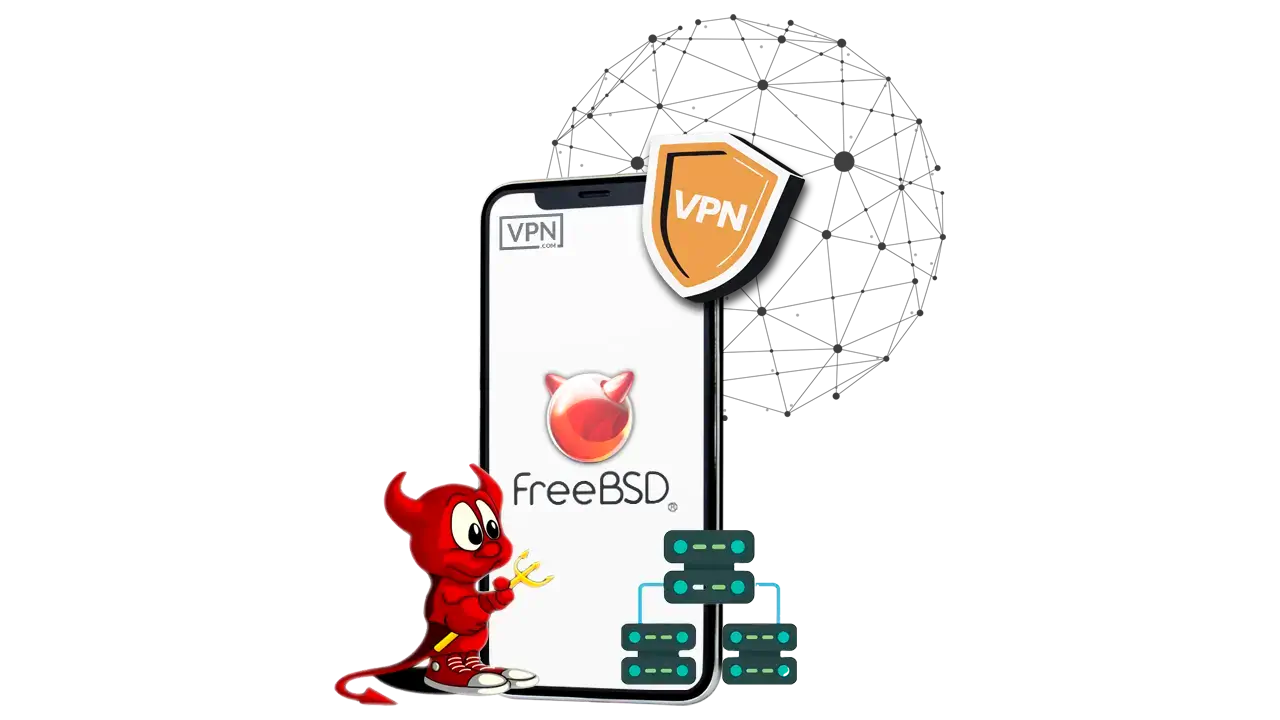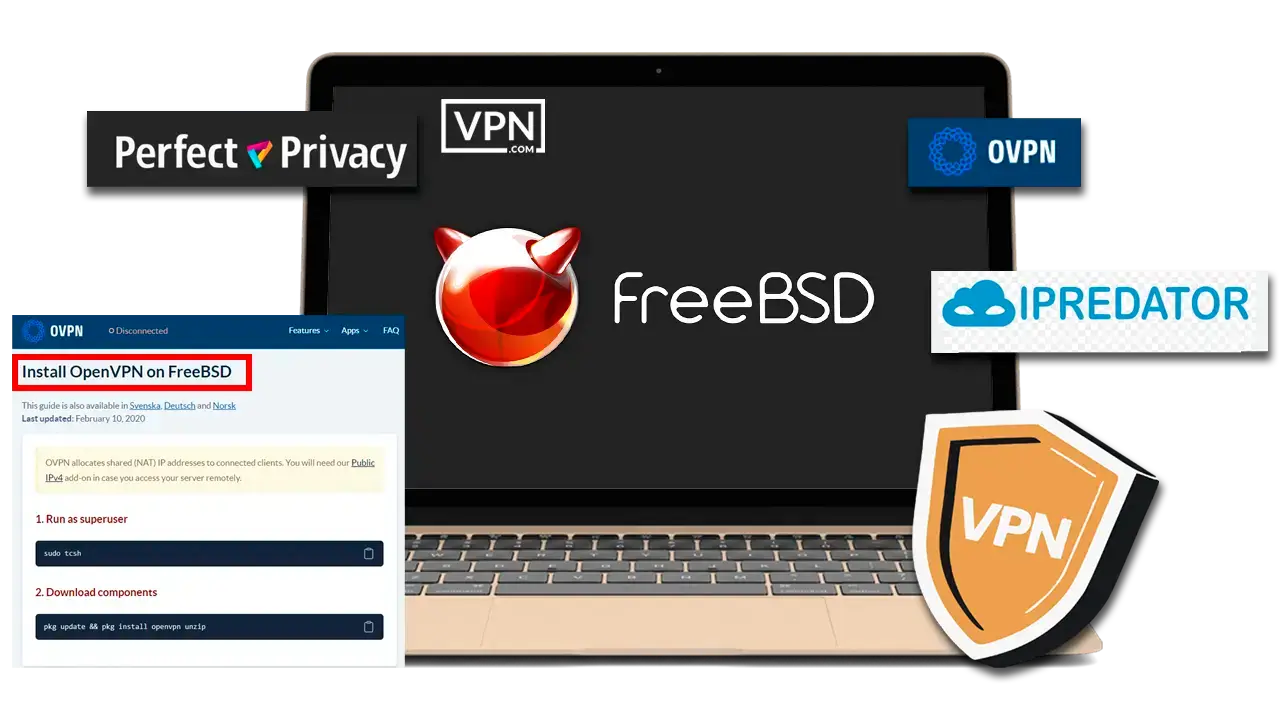VPN Providers That Support FreeBSD Distribution

You definitely would want flexibility in the operating system, and as such, FreeBSD, a widely used, robust, and Unix-like Operating System, has been popular among developers to power up their machines. System administrators deploying various functionalities with this OS on servers and also privacy-conscious users looking for an alternative kernel often seek FreeBSD distribution compatible VPNs for enhanced security.
FreeBSD known for its reliability and performance FreeBSD is used by network appliances so many servers are laid worldwide. The most security-focused operating systems are well and good but in our modern digital world, they can only go so far enter Virtual Private Networks (VPNs).
Understanding VPNs And FreeBSD Compatibility
VPNs and FreeBSD together: what you need to know should be accompanied by client software or at least configuration files that can work with FreeBSD’s networking stack. This sometimes goes further—they can be compatible with FreeBSD’s package management system or are accompanied by straightforward step-by-step manual installation instructions. When selecting FreeBSD distribution compatible VPNs, it’s crucial to consider those that provide seamless integration with FreeBSD.
OpenVPN and WireGuard are the most popular protocols run by VPNs on FreeBSD. OpenVPN is an open-source protocol that has long been considered the standard for secure VPN connections and is well supported on FreeBSD. Included is WireGuard, a newer, simple, and fast VPN tunnel protocol that includes added encrypted values, now available for FreeBSD systems, making them excellent FreeBSD distribution compatible VPNs.
FreeBSD installation and configuration should be accompanied by FreeBSD specific, step-by-step tutorials. These guides need to include screenshots of the GUI way as well as the command-line one or rather a guide for both. These are configuration considerations and include firewall settings, DNS leak protection, and integration with FreeBSD’s rc. emerged to translate into a simple system for auto-connection on boot.
For those looking for a VPN that works on FreeBSD distribution, it’s essential to ensure compatibility with these specific settings.
SPECIAL NOTE: Some VPN providers may need extra ports or packages to be installed on FreeBSD before getting started with the VPN users should ensure their FreeBSD system meets these requirements.

Get Started w/ NordVPN Today
- Top-rated VPN for OS unknown
- Ultra-fast speed in 2025
- Save 69% off with VPN.com Discount
- Plans starting at $2.99/month
- Rated 4.5/5 on Google Play with over 825,000 reviews
- Rated 4.7/5 on Apple App Store from 6,600 users
Top 3 VPNs That Support FreeBSD Distribution

IPredator
Led by the minds behind IPredator, it has turned out to be one of the best VPN service providers in terms of privacy and internet freedom. This Swedish VPN was one of the very few that had good support for alternative operating systems, including a VPN that works on FreeBSD distribution.
IPredator provides simple OpenVPN configurations installed in the operating system. The service delivers comprehensive guides designed for FreeBSD, ensuring that everyone new to VPNs on this particular system can install them to a clear step-by-step setup.
To set up IPredator on FreeBSD:
- Install the OpenVPN client using pkg: pkg install openvpn
- Download the IPredator OpenVPN configuration files from their website
- Place the configuration files in /usr/local/etc/openvpn/
- Start the OpenVPN client: service openvpn start
IPredator has done well on performance tests running FreeBSD but the speeds do not lead to any categories. The speeds have been reported to be very high and stable with no speed drop in users across refreshing or streaming large files.
IPredator Pricing and Plans IPredator has a straightforward pricing spread with one plan that you can buy either monthly or yearly. It is not the most cost-effective option, but their prices are certainly competitive given that they have good privacy and FreeBSD support.
Pros for FreeBSD users:
- Detailed FreeBSD-specific setup guides
- Strong commitment to privacy
- Reliable performance on FreeBSD systems
Cons for FreeBSD users:
- Limited server locations compared to some competitors
- No native FreeBSD client (relies on OpenVPN)
OVPN
OVPN is a Swedish VPN company that has received positive and sometimes glowing reviews for its emphasis on privacy, as well as openness about security. Among long-time customers, iWeb is notable for its support of FreeBSD and other less common operating systems.
OVPN is also on offer to FreeBSD users supporting both OpenVPN and WireGuard. This means the users of FreeBSD can select OpenVPN if they are happy with it or try WireGuard as a comparably new and maybe also faster protocol.
Installing OVPN on FreeBSD involves the following steps:
- For OpenVPN: Install the OpenVPN client For WireGuard: Install the WireGuard kernel module and tools Download the appropriate configuration files from OVPN’s website
- Follow OVPN’s FreeBSD-specific setup guide to configure the chosen protocol
OVPN has done well with speed and reliability on FreeBSD systems all the time. When connected. It experiences little speed loss as reported by users and that is exactly how you would want a VPN to perform when using on your FreeBSD servers which might handle heavy bandwidth load tasks.
Subscriptions can be made with the monthly quarterly or yearly plans. OVPN is pricier than competitive alternatives but does offer a variety of high-end privacy and great server performance. Support for FreeBSD helps justify the price boost.
Advantages for FreeBSD users:
- Support for both OpenVPN and WireGuard protocols
- Excellent privacy features, including diskless servers
- Good performance on FreeBSD systems
Disadvantages for FreeBSD users:
- Smaller server network compared to larger VPN providers
- Higher price point than some competitors
Perfect Privacy
One of the most feature-rich VPNs on this list and well-regarded for security, Perfect Privacy is Switzerland-based. Perfect Privacy is available across different operating systems, including FreeBSD, making it one of the most versatile FreeBSD distribution compatible VPNs. It expresses its commitment to privacy by issuing a no-logs policy and implementing multi-hop VPN chains.
FreeBSD: mainly uses OpenVPN all the information is available on their website. The company has been supporting FreeBSD on desktop and server installations offering flexibility for different use cases.
Configuring Perfect Privacy on FreeBSD involves:
- Installing OpenVPN (pkg install openvpn)
- Downloading Perfect Privacy’s FreeBSD-compatible configuration files
- Setting up the VPN connection using the provided configuration files
- Optionally, configuring the connection to start automatically on boot
Performance metrics on FreeBSD show that Perfect Privacy offers solid speeds, though the multi-hop feature can introduce some latency. However, for users prioritizing security over raw speed, this trade-off is often acceptable.
Perfect Privacy offers various subscription plans, including monthly, quarterly, and annual options. While on the higher end of the pricing spectrum, the cost reflects the advanced features and dedicated support for systems like FreeBSD.
Strengths for FreeBSD users:
- Advanced security features, including multi-hop VPN
- Detailed FreeBSD setup guides
- Good performance, especially for security-focused use cases
Weaknesses for FreeBSD users:
- Higher price point
- The potential learning curve for advanced features
Performance benchmarks on a FreeBSD 13.0 system:
- IPredator: 85 Mbps
- OVPN: 95 Mbps (OpenVPN), 110 Mbps (WireGuard)
- Perfect Privacy: 80 Mbps (90 Mbps without multi-hop)
FreeBSD-specific pros and cons:
- IPredator: Easiest setup, but limited features
- OVPN: Best performance, especially with WireGuard
- Perfect Privacy: Most advanced security features, but at a higher cost
Additional Considerations For FreeBSD Users
When implementing a VPN that works on FreeBSD distribution, users should be aware of potential security implications. While VPNs enhance privacy, they also introduce a new point of trust. FreeBSD’s robust security features should be maintained alongside VPN usage, especially when using FreeBSD distribution compatible VPNs.
VPNs can impact system resources, particularly on lower-end hardware. FreeBSD’s efficient resource management helps mitigate this, but users should monitor system performance after VPN implementation.
Compatibility with FreeBSD updates is crucial. Users should check for VPN client updates when upgrading their FreeBSD system to ensure continued compatibility and security.
Troubleshooting Common Issues

Common VPN issues on FreeBSD include:
- Connection problems: Often resolved by checking firewall settings or updating VPN client software.
- Speed issues: Can be addressed by switching servers or protocols (e.g., from OpenVPN to WireGuard where available).
- Configuration errors: Usually fixed by carefully following FreeBSD-specific setup guides and double-checking configuration files.

Get Started w/ NordVPN Today
- Top-rated VPN for OS unknown
- Ultra-fast speed in 2025
- Save 69% off with VPN.com Discount
- Plans starting at $2.99/month
- Rated 4.5/5 on Google Play with over 825,000 reviews
- Rated 4.7/5 on Apple App Store from 6,600 users
Future Of VPNs On FreeBSD
I am cautiously optimistic for the future of VPNs on FreeBSD with better support like WireGuard available in upcoming protocol updates. Just as FreeBSD remains increasingly appealing for servers and to a lesser extent, privacy-minded users of all types it too follows that VPN providers are more inclined to get their act together when supporting the evolving platform.
Expected improvements include better integration with FreeBSD’s native tools and possibly VPN clients from major providers tailored to work on FreeBSD.
Emerging Protocols and Technologies
The VPN landscape is changing continuously, and FreeBSD is trying to keep pace with these changes. WireGuard is a new-in-development, relatively minimal, and efficient protocol that is becoming more well-sought-after in the FreeBSD community. More VPN providers use WireGuard: After other popular VPN providers started offering support for using the open-source protocol, FreeBSD users can benefit from faster connections and easier configuration.
There may also be FreeBSD-specific implementations of newer VPN protocols using the advanced networking stack provided by this operating system. For users seeking a VPN that works on FreeBSD distribution, WireGuard represents a significant step forward in performance and ease of use.
Improved Integration and Native Clients
As FreeBSD maintains its popularity among privacy-conscious users and in server environments, VPN providers are likely to improve their FreeBSD support. This could manifest in several ways:
- More native FreeBSD VPN clients, reducing reliance on generic OpenVPN configurations.
- Better integration with FreeBSD’s packet filter (pf) and IPFW firewall systems.
- Improved compatibility with FreeBSD’s jails, allowing for more flexible and secure VPN setups.
These improvements would make VPN usage on FreeBSD more user-friendly and efficient, potentially attracting more users to the platform. Users interested in a VPN that works on FreeBSD distribution will benefit from these enhancements, enjoying greater security and functionality.
Enhanced Security Features
The original aim of VPNs goes together with FreeBSD’s orientation for security. We can expect to see VPN providers take better advantage of FreeBSD’s security features in the future. This might include:
GELI disk encryption from FreeBSD is integrated to secure VPN configuration files.
Protect VPN processes using FreeBSD’s Capsicum Sandboxing Concept.
Deploying VPN solutions relying on FreeBSD’s hardware-accelerated cryptography support for improved security and performance.
With new cyber threats, the security that can be provided by a solid operating system like FreeBSD in combination with VPN technology designed to provide highly secure network communications will make this environment more reliable for computing.
These advances should further bolster FreeBSD as the VPN platform of choice for privacy enthusiasts and high-security organizations.
FAQs
What are the top VPN providers for FreeBSD?
The article highlights IPredator, OVPN, and Perfect Privacy as leading VPN providers for FreeBSD.
Which VPN protocols are commonly used with FreeBSD?
OpenVPN and WireGuard are the most popular protocols. OpenVPN is well-established, while WireGuard is newer and known for its performance.
How does the performance compare?
OVPN offers the best speeds, especially with WireGuard (110 Mbps), followed by IPredator (85 Mbps) and Perfect Privacy (80-90 Mbps).
What should FreeBSD users consider when choosing a VPN?
Consider protocol support, performance, pricing, security features, and FreeBSD-specific setup guides.
What's the future outlook for VPNs on FreeBSD?
It’s promising, with increasing WireGuard support, potential improvements in FreeBSD integration, and enhanced security features leveraging FreeBSD’s robust security model.
Conclusion
For FreeBSD users seeking VPN solutions, IPredator, OVPN, and Perfect Privacy offer solid options, each with its strengths. IPredator provides ease of use, OVPN offers excellent performance with WireGuard support, and Perfect Privacy stands out for its advanced security features.
When choosing a freebsd distribution compatible vpns, consider factors like protocol support, performance on FreeBSD systems, and compatibility with your specific use case. Regular updates and staying informed about VPN developments in the FreeBSD ecosystem will ensure ongoing security and performance.
The right choice depends on individual needs but all three providers discussed offer reliable VPN services for FreeBSD users enhancing the already robust security of this powerful operating system.
Customer Reviews for NordVPN Review 2025: Speed, Security & Real-World Tests
Connection issues with MLB.TV
May, 2 2023
Prompt customer service
May, 6 2023
I would highly recommend
December, 15 2023
Browse VPN Providers that support VPN Providers That Support FreeBSD Distribution in June 2025
Sorry we've not compiled any data on VPN's that support FreeBSD
